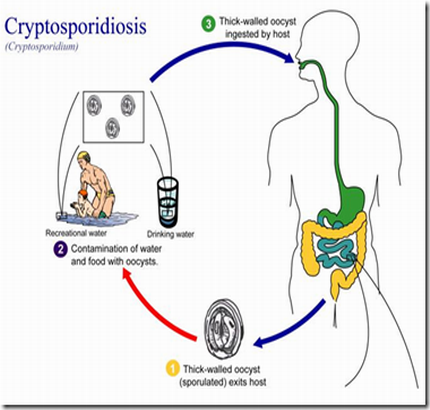What's in this article?
Cryptosporidium infection overview
Cryptosporidium infection (cryptosporidiosis) is an illness caused by tiny cryptosporidium parasites. When cryptosporidia (krip-toe-spoe-RID-e-uh) enter your body, they travel to your small intestine and then burrow into the walls of your intestines. Later, cryptosporidia are shed in your feces.
In most healthy people, a cryptosporidium infection produces a bout of watery diarrhea and the infection usually goes away within a week or two. If you have a compromised immune system, a cryptosporidium infection can become life-threatening without proper treatment.
You can help prevent a cryptosporidium infection by practicing good hygiene and avoiding swallowing water from pools, recreational water parks, lakes and streams.
What are the causes of Cryptosporidium?
Infection is through contaminated material such as earth, water, uncooked or cross-contaminated food that has been in contact with the feces of an infected individual or animal.
Millions of Crypto organisms (oocysts) can be released in the bowel movement of an infected human or animal. You can become infected after accidentally ingesting the oocysts.
Contact must then be transferred to the mouth and swallowed. It is especially prevalent amongst those in regular contact with bodies of fresh water including recreational water such as swimming pools.
Other potential sources include insufficiently treated water supplies, contaminated food, or exposure to feces. The high resistance of Cryptosporidium oocysts to disinfectants such as chlorine bleach enables them to survive for long periods and still remain infective.
Some outbreaks have happened in day care related to diaper changes.
How is Cryptosporidium spread?
Cryptosporidium lives in the intestine of infected humans or animals. An infected person or animal sheds Crypto parasites in the stool. Millions of Crypto germs can be released in a bowel movement from an infected human or animal. Shedding of Crypto in the stool begins when the symptoms begin and can last for weeks after the symptoms (e.g., diarrhea) stop. You can become infected after accidentally swallowing the parasite. Cryptosporidium may be found in soil, food, water, or surfaces that have been contaminated with the feces from infected humans or animals. Crypto is not spread by contact with blood.
- By putting something in your mouth or accidentally swallowing something that has come into contact with stool of a person or animal infected with Crypto.
- By swallowing recreational water contaminated with Crypto. Recreational water is water in swimming pools, hot tubs, Jacuzzis, fountains, lakes, rivers, springs, ponds, or streams. Recreational water can be contaminated with sewage or feces from humans or animals.
- By swallowing water or beverages contaminated with stool from infected humans or animals.
- By eating uncooked food contaminated with Crypto. Thoroughly wash with uncontaminated water all vegetables and fruits you plan to eat raw. See below for information on making water safe.
- By touching your mouth with contaminated hands. Hands can become contaminated through a variety of activities, such as touching surfaces (e.g., toys, bathroom fixtures, changing tables, diaper pails) that have been contaminated by stool from an infected person, changing diapers, caring for an infected person, changing diapers, caring for an infected person, and handling an infected cow or calf.
- By exposure to human feces through sexual
How Does Cryptosporidium Affect You If Your Immune System Is Severely Weakened?
In people with AIDS and in others whose immune system is weakened, crypto can be serious, long-lasting, and sometimes fatal. If your CD4+ cell count is below 200, crypto is more likely to cause diarrhea and other symptoms for a long time. If your CD4+ count is above 200, your illness may not last more than 1 to 3 weeks or slightly longer. However, you could still carry the infection, which means that the crypto parasites are living in your intestines, but are not causing illness. If your CD4+ count later drops below 200, your symptoms may reappear.
Treatment of Cryptosporidium
For those with normal immune systems, specific treatment is not required.
There is no available effective treatment for reducing diarrhoea in people with immune suppression.
The following are general recommendations for the treatment of gastroenteritis:
- Give plenty of fluids. Oral rehydration solution is highly recommended for children with mild to moderate dehydration. It is available at pharmacies and should be administered following the instructions on the packaging.
- Mildly unwell children should be given their usual fluids more often Carbonated (fizzy) drinks or undiluted juice should be avoided.
- Medicines to prevent vomiting or diarrhoea should not be given (especially in children), except where specifically advised by a doctor.
- Breastfed babies should continue to be breastfed throughout their illness.
- Children on formula or solid diets should restart their normal diet (including full strength lactose containing milk) following rehydration with oral rehydration solution.
- Children who are hungry or ask for food should be given small portions of their usual foods, but avoid foods high in sugar or fat.





